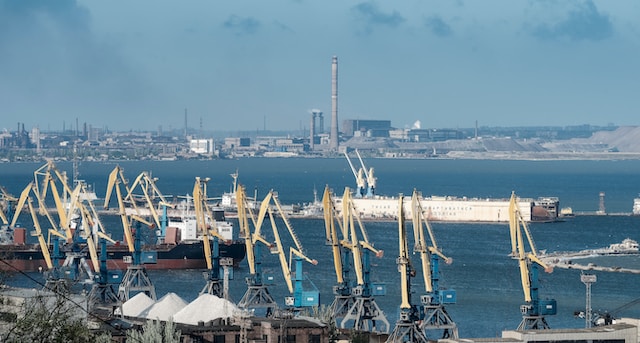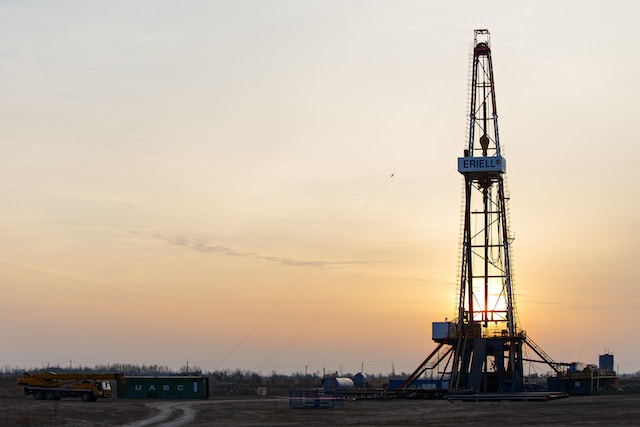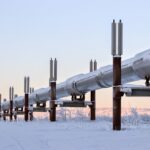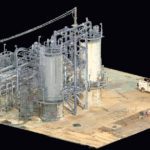Oil and gas engineering is a dynamic and complex field dedicated to extracting, processing, and distributing oil and natural gas. This discipline is critical to meeting the world’s energy needs and plays a central role in the global economy and the ongoing transition toward sustainable energy.
Oil and gas engineers work across multiple domains, employing various skills, knowledge, and technological expertise to safely and efficiently extract and process these invaluable resources. There are several types of engineering within this field, each with its unique focus.
 via Unsplash
via Unsplash
Mechanical and electrical engineers design and maintain the industry’s hardware, while civil engineers ensure the necessary infrastructure is in place. Process and production engineers optimize transforming crude resources into usable products, and instrumentation and control engineers oversee the vital monitoring systems.
Other specialists include value, facilities, reservoir, drilling, and compression engineers, along with petrophysical and aftermarket engineers. Becoming an oil and gas engineer typically requires a relevant engineering degree, strong foundational science and mathematics skills, and expertise in industry-specific software.
Experience in the field, problem-solving abilities, and a readiness to work in challenging conditions are also necessary. While there are overlaps with other disciplines like petroleum and chemical engineering, oil and gas engineering’s focus on the petroleum industry sets it apart.
Studying oil and gas engineering opens doors to a career at the forefront of technology and environmental stewardship, often with opportunities to work globally and secure competitive salaries. If you’re intrigued by the intersection of science, technology, and real-world problem-solving, this field might be the perfect fit.
What is an Oil and Gas Engineer and What Do They Do?
Given the global reliance on oil and gas for energy, oil and gas engineers play an essential role in various sectors, from transportation to manufacturing.
Oil and gas engineers carry out diverse tasks throughout the life cycle of oil and gas fields, utilizing a wide range of scientific, technical, and managerial skills.
Their work begins with the exploration phase, employing geological and geophysical methods to locate potential oil and gas reserves. In the drilling phase, these professionals design and implement strategies to extract these resources efficiently and safely.
Once extracted, oil and gas engineers are involved in the refinement and processing stage, which converts the raw materials into usable fuels and other products. They also oversee the transportation and storage of these products, ensuring adherence to safety standards and environmental regulations.
In addition, they play a crucial role in managing resources by devising methods to increase recovery rates and reduce costs. They also handle the decommissioning of sites once reserves are depleted. Thus, oil and gas engineers are integral to the global energy sector, contributing to its productivity, safety, and sustainability.
Types of Engineering in Oil and Gas
There are many different types of engineers in the oil and gas industry, each of which plays a unique role. Here are some of the most common types of individuals who will contribute to the oil and gas industry on a regular basis.
Mechanical Engineers
Mechanical engineers in the oil and gas industry focus on designing, developing, and maintaining mechanical systems such as drilling rigs and pumping units, which are integral to the extraction process.
Electrical Engineers
In the oil and gas industry, electrical engineers are primarily involved in designing, testing, and implementing electrical components or systems within oil and gas facilities, such as power systems and motor controls.
Civil Engineers
Civil engineers working in oil and gas will typically be focused on designing and constructing infrastructure like roads, bridges, and platforms that facilitate oil and gas extraction and transportation.
Process Engineers
Process engineers have a unique role. They focus on optimizing the process of transforming crude oil and gas into usable products, overseeing refinery operations, and ensuring maximum efficiency.
Production Engineers
Production and process engineers often go hand in hand. While process engineers manage the transformation of crude oil and gas into refined products, production engineers go back to the beginning. They manage oil and gas production, focusing on optimizing well performance, improving recovery techniques, and managing the costs associated with production.
Instrumentation and Control Engineers
In a niche within oil and gas engineering, instrumentation and control engineers design, develop, and manage the systems that monitor and control the conditions of extraction, production, and refining processes.
Value Engineers
The oil and gas industry, like most fields, depends on profitability. Value engineers make this happen through their focus on optimizing the value of projects by finding the balance between cost, reliability, performance, and safety of processes and operations.
Facilities Engineers
The oil and gas industry depends on facilities engineers to oversee the design and management of facilities like offshore platforms and onshore plants, ensuring they operate safely and efficiently.
Reservoir Engineers
Like production engineers, reservoir engineers are focused on the early steps of the oil and gas production process. They specialize in determining the most efficient way to extract oil and gas from underground deposits by studying the characteristics of reservoirs.
Drilling Engineers
Much of the world’s oil is drilled out of the ground, either onshore or offshore. Drilling engineers play an important part in this process, as they are responsible for planning and managing the process of drilling oil and gas wells, ensuring safe and efficient operations.

via Unsplash
Compression Engineers
In order to safely travel through pipelines, oil and gas must maintain a certain pressure so that they can flow. That’s where compression engineers come in. They specialize in designing, operating, and maintaining compression equipment crucial for transporting oil and gas through pipelines.
Petrophysical Engineers
With backgrounds in geology, petrophysical engineers analyze the physical and chemical properties of rock formations and the contained fluids, which informs drilling and reservoir management strategies.
Aftermarket Engineers
Involved closely in the final steps of the oil and gas production chain, aftermarket engineers provide post-sales support, including troubleshooting, maintenance, and optimizing equipment and systems used in oil and gas operations.
What Are the Typical Requirements for an Oil and Gas Engineer?
The requirements for an oil and gas engineer typically include a combination of education, skills, experience, and personal qualities.
Educationally, a bachelor’s degree in petroleum engineering, mechanical engineering, chemical engineering, or a related field is generally required. Some roles may require a master’s degree or even a Ph.D., especially for more specialized or senior positions.
In addition, licensure as a Professional Engineer (PE) can be a significant advantage, and in some jurisdictions, may be legally required to approve projects or supervise others.
In terms of skills, oil and gas engineers need a strong foundation in mathematics, physics, and chemistry. They must have expertise in using computer-aided design (CAD) systems and other relevant software, such as reservoir simulation programs. Knowledge of safety procedures and regulations, environmental laws, and drilling procedures is also vital.
Experience in the field is often a crucial requirement. Entry-level engineers may start as interns or assistants, gradually gaining practical experience and responsibilities. Several years of direct industry experience may be required for senior or specialist roles.
Personal qualities include problem-solving, decision-making, attention to detail, and strong communication abilities. Given the frequently remote locations of oil and gas extraction, physical fitness and the ability to work in challenging conditions can also be important.
The typical requirements for an oil and gas engineer include a bachelor’s degree in engineering, preferably in petroleum engineering. Some employers may also require candidates to have experience in the oil and gas industry.
Oil and gas engineers typically work full-time, and may be required to work overtime or on call. They may also travel to work sites, which can be located in remote areas. If you are considering a career in oil and gas engineering, ensure that these requirements are compatible with your job preferences.
What Is the Average Salary for an Oil and Gas Engineer?
The median annual wage for oil and gas engineers was $130,850 in May 2021. The lowest 10% of earners in the field made less than $78,390, and the highest 10% earned over $208,000.
Job prospects for oil and gas engineers are expected to be good over the next decade. Employment of oil and gas engineers is projected to grow 8% from 2020 to 2030, about as fast as the average for all occupations.
Demand for oil and gas is expected to continue to grow, although at a slower pace than in the past. This growth will be driven by the increasing demand for energy from developing countries.

via Unsplash
FAQs
Why study oil and gas engineering?
Studying oil and gas engineering equips you with specialized skills and knowledge to meet the global energy demand. You’ll gain expertise in extracting and processing vital resources and be at the forefront of technology, environmental stewardship, and energy sustainability. Plus, the field often offers high earning potential and opportunities to work globally.
Is oil and gas engineering the same as petroleum engineering?
While related, oil and gas and petroleum engineering are different. Petroleum engineering is a subset of oil and gas engineering, primarily focused on extracting crude oil and natural gas from the earth. Oil and gas engineering, on the other hand, encompasses a broader range, including extraction, transportation, refining, and distribution of these resources.
What is the difference between chemical engineering and oil and gas engineering?
Chemical engineering is a broad discipline that applies chemistry, physics, and mathematics principles to design and develop processes for producing, transforming, and transporting materials.
Oil and gas engineering, a more specialized field, concentrates specifically on extracting, producing, and refining oil and natural gas. While a chemical engineer might work across many industries, an oil and gas engineer typically focuses on the petroleum industry.
Final Thoughts
Oil and gas Engineering represents a highly specialized and critical discipline in our energy-dependent world. With diverse responsibilities, from the exploration and extraction of reserves to their refinement, processing, and distribution, these engineers are integral to the lifecycle of oil and gas fields. Their work significantly impacts the global economy and the sustainability of our energy practices.
Through carefully applying scientific, technical, and managerial skills, oil and gas engineers optimize the production and use of these vital resources. Their focus on efficiency, safety, and environmental considerations ensures the industry can responsibly meet the world’s energy needs.
The ability to increase recovery rates and reduce costs also emphasizes the importance of their role in resource management. As stewards of these valuable resources, they contribute to extending the lifespan of oil and gas reserves and minimizing their environmental impact.
In conclusion, oil and gas engineers play an indispensable role in our world, combining their knowledge and skills to drive the energy sector forward. Their contributions are essential in bridging the gap between our present needs and a more sustainable future.





